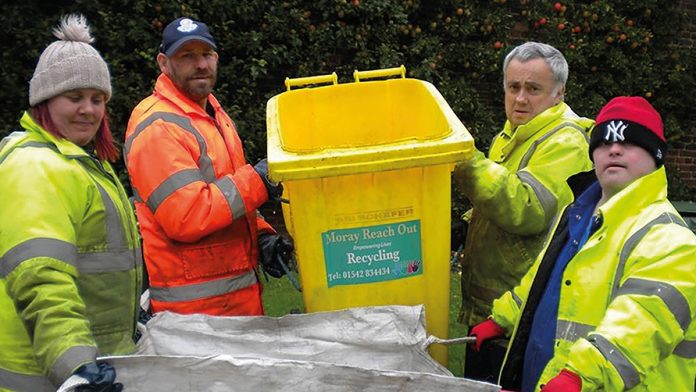One simple way to express the concept of a circular economy is that it is designed to reduce the demand for raw materials in products; to encourage reuse, repair and manufacture by designing and selling products and materials to last as long as possible; and to recycle waste and energy to maximise the value of any waste that is generated.
As we enter the second decade of the 21st century, our human footprint in the natural world has never been more significant. Plastic pollution across the globe can no longer be hidden in the poverty-stricken communities of third world industrial ghettos. It is attacking our lives with ferocious disregard of class or culture and we are wearing, breathing and eating polymer everywhere we turn. However, it is not the material that is the problem but the way we manage it.
Moray Reach Out and ReBOOT are both social enterprises who provide training and employment opportunities for vulnerable people in the local area. From an idea hatched back in 2016 by respective business managers Shona Radojkovic and Lee Mcgrath the Reach Out And Reboot (Plastics & Waste) Project – ROAR – has been running since February 2019.
ROAR is looking at ways the plastics collected by both organisations can be recycled into products made by their service users and sold back into the local economy. The project has funding from The Scottish Rural Network and Moray Reach Out to conduct an 18-month feasibility study on the potential to develop sustainable goods from recycled plastics that support reducing waste, littering and the carbon footprint.
Moray Reach Out has a well-established PET 1 and HDPE 2 plastic collection from local businesses in Moray and ReBOOT accumulate ABS plastic as a waste stream from their computer and IT hardware recycling services.
With thanks to a generous donation from The Gordon and Ena Baxter Foundation, Moray Reach Out has been able to purchase an industrial granulating machine. Similarly, ReBOOT has had support from Berry Burn Community Fund and Highlands and Islands Enterprise, and now has a small extrusion and 3D printing set up in operation. Ideas are in full development and the addition of a compression heat press is underway which will add to the process and design possibilities currently being investigated in the project.
Ultimately ROAR aims to recycle local plastic waste streams into long life items that capture and transform local waste. Crafted by local people with learning difficulties and mental health illness this circular economy business model would provide increased opportunities in creativity, training and workplace skills. The production of quality recycled products available to customers in Moray Reach Out and ReBOOT retail outlets would further encourage lifestyle choices which reduce plastics consumption on a personal level.
For more information on Moray Reach Out, visit www.morayreachout.org.uk
For more information on ReBOOT, visit www.reboot-forres.co.uk






